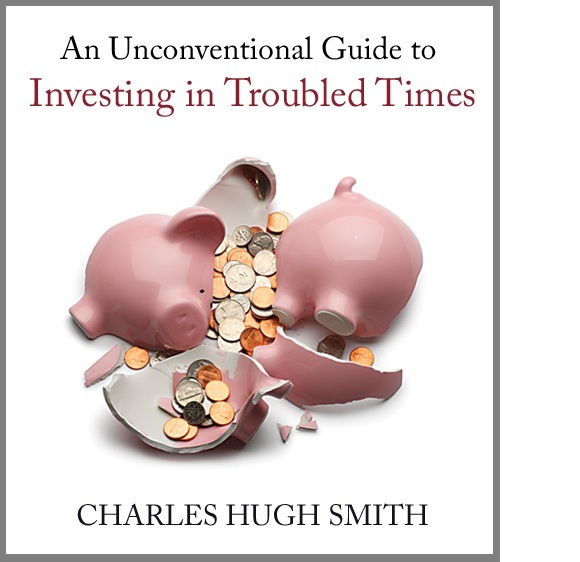MF Global: When Belief in the System Fades
Faith in the Status Quo is fading fast, spurred on by the long line of critical dominoes toppled by MF Global.
I have previously written on the seriousness of this subject but there still seems to be no widespread appreciation of its implications.In complex economic systems, futures markets are as important as is a stable and reliable medium of exchange.
A model of normal transactions is: A forward contract is initiated between parties. The parties then proceed to hedge their risk in the futures and commodities markets.
A forward contract is a nonstandard contract between parties. For example, a grainery may agree to deliver a specified amount of grain to a processor at a negotiated price (market today or at delivery, etc). Depending on contract specifics, both parties are now concerned that price may move against them. In the case of market price at delivery, for the selling party, the concern is falling prices. For the buying party, the concern is rising prices.
If price is negotiated at the market upon contract initiation, then for the seller the concern is rising prices and vise versa for the buyer. Why? Because of the present value of money.
The futures contract is a standardized contract that specifies quality, quantity and time. It is marked to market every day. Positions are not held directly between parties but between a party and the Clearinghouse. The Clearinghouse is there to insure performance of the futures contract, meaning, even if a party defaults on physical delivery, the monetary value of the contract will be delivered without fail.
Full Commission Merchants (FCM's) collect and warehouse client funds and deposit client funds with the Clearinghouse as margin (performance bonds). Client funds are supposed to be sacrosanct. But for some reason it was thought to be a good idea to allow brokerages to use client funds to purchase investment grade instruments on a short term basis. The firms and the clients made money on the earned interest. This has gone on without notice or problem until the recent 100-year flood of MF Global.
The process of hedging allows parties with a legitimate business interest that wish to shed risk transfer it to those willing to take risk in expectation of a return (speculators). In other words, speculators are absorbing price risk and therefore its volatility. Because of the mechanism of the futures markets day-to-day volatility is not put through to the economy on a day-to-day basis. This allows stability of prices which is really stability of the exchange medium.
Take away this mechanism and we have to imagine an economy in which farmers, for example, would not be willing to take the risk of planting enough food to feed the population, or the price for doing so would be very dear as to make it unaffordable to all but the wealthy. Or as news and rumors of unfavorable weather, droughts and crop failures hits the wire, prices fluctuate instantly and wildly at the end user level.
This instability is a positive feedback loop that leads to shortages, hoarding, increased poverty and overall economic and social instabilityas people are thrust into a law of the jungle world where moment-to-moment survival dominates the psyche.
I reiterate, in a complex economy, futures markets are as important as is a reliable medium of exchange. Currently both are at risk of being destroyed.
MF Global punctuates the issues at hand. Opacity, willful deception (fraud), the absence or impotence of the rule of law, which is nothing less than a collapse in government. With that said, opacity and fraud are a human constant. It is the collapse of government that poses the greatest threat.
In a way, a belief in the value, transparency, trust and reciprocity of the System is like a religious belief. The converts, the true believers, are the ones who work like crazy for the company, or the Force or the firm. And when the veil of illusion is tugged from their eyes, then the Believer does a reversal, and becomes a devout non-believer in the System. He or she drops out, moves to a lower position, or "retires" to some lower level of employment.
When the most dedicated servants of the system awaken to the realization that they are not benefitting from their service as they'd once believed, that their near-religious faith in the System has been bruised by the grim knowledge that the few are benefitting from the lives and sacrifices of the many, then they simply quit, or move down the chain to an undemanding position.
Then you realize you don't have to work 60 hours a week, or live in a big house. Let somebody else step up and take all the heat and the guff and the never-catch-up endlessness of the work.
At that point--a point I anticipate will come to pass in the next 5-10 years--then the elites' machine grinds to a crawl. People don't have to throw their bodies on the gears of the machine--they just have to stop believing, stop taking that promotion, and stop wanting to trade their entire lives for a thin slice of more more more.
If that day comes, then the social contract will have to be rewritten, or an entirely new set of elites will have to emerge with a new social contract which people are willing to believe and trust.
My Big Island Girl(fun, free MP3 song)
Readers forum:DailyJava.net.
Order Survival+: Structuring Prosperity for Yourself and the Nation (free bits) (Kindle) orSurvival+ The Primer (Kindle) or Weblogs & New Media: Marketing in Crisis (free bits)(Kindle) or from your local bookseller.
| Thank you, John D.($30), for your much-appreciated generous contribution to this site -- I am greatly honored by your support and readership. | Thank you, Saigal V.M. ($20), for your most generous contribution to this site -- I am greatly honored by your support and readership. |
Read more...

































